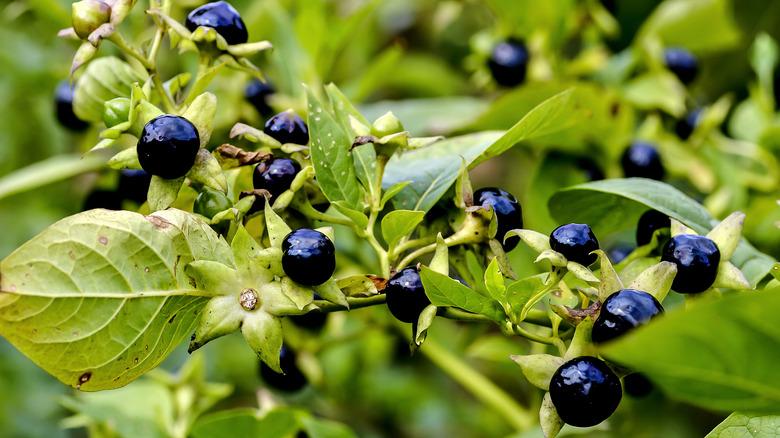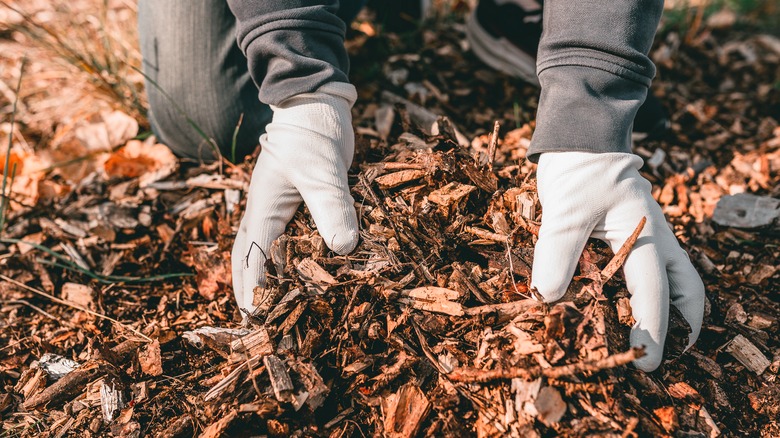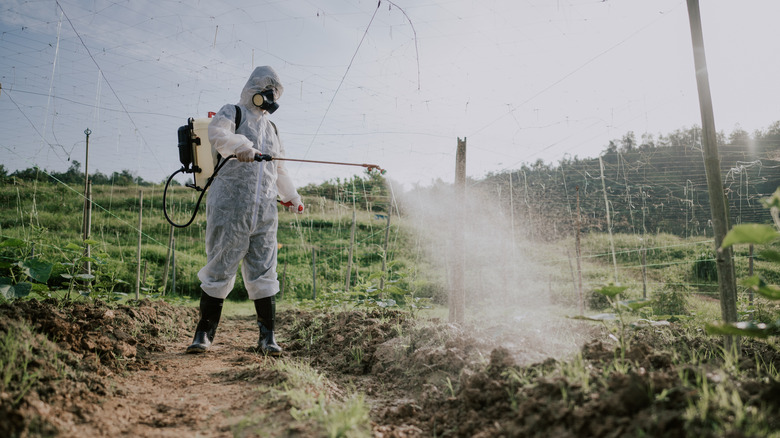How To Keep Dangerous Black Nightshade Out Of Your Garden
If you discover black nightshade (scientifically known as Solanum nigrum) growing in your garden, it's essential to tackle the problem immediately. This invasive weed poses a significant risk to the health of your garden. Traditional methods like mulching, hand-pulling, or pruning are usually effective and straightforward to implement. These methods have been tried and tested over time and are effective for minor infestations. However, if you're facing a more extensive issue or seeking faster results, chemical herbicides are a viable solution if you are comfortable using such products in your garden.
Beyond your garden health, the potential for black nightshade to pose a serious health risk to both humans and various animals (including but not limited to pets and farm livestock) increases the urgency of dealing with it. The entire anatomy of the plant — from its berries and leaves to its roots — contains a dangerous alkaloid known as solanine. Ingesting even a small amount of this plant can lead to serious health problems. Immediate symptoms may include severe stomach pain requiring prompt medical treatment, breathing challenges, and life-threatening conditions in extreme scenarios. In short, dealing with this weed is not merely about keeping your garden pretty; it's about safeguarding the health and well-being of those who come into contact with the plant.
Mulching, pulling out, and pruning black nightshade
One effective way to keep black nightshade at bay is to mulch around the plant. Laying down a thick layer of organic material like sawdust creates a barrier that makes it challenging for the weed to take root. However, should you encounter black nightshade already sprouting in your garden, swift action is essential to prevent it from spreading further. Wear gloves to shield your skin from harmful substances the plant might contain. Gently but firmly pull the weed out of the ground, removing all of its roots. It's best to tackle this invasive plant when it is young and before it has the chance to produce seeds that can increase further. If the soil is too dry and causes difficulty to pull out, try adding water. Once removed, it's crucial to dispose of the plant carefully. Bag it separately and discard it to prevent it from regrowing or spreading its seeds elsewhere.
Pulling it out may not be practical when the black nightshade has become entwined with your desired plants. This is when pruning can be a useful alternative. Equipped with sharp pruning shears, trim off any visible portions of the black nightshade, taking care not to damage the plants you want to keep. Since this weed is known for its tenacity, monitor the area closely for signs of regrowth, and be prepared to repeat the pruning process if necessary.
Using chemical control methods: glyphosate and triclopyr-based herbicides
If black nightshade is overwhelming your garden and you're searching for a swift solution, a weed killer like a chemical herbicide is one option. However, exercise caution when using these products, as they can harm other plants and negatively impact the environment. Herbicides should be your last resort after trying other methods like mulching or hand-pulling the weeds, given their broad effect on plant life and potential environmental footprint.
RoundUp is commonly used among herbicides as it contains glyphosate, a chemical known for its efficacy in killing black nightshade. Glyphosate interferes with the plant's ability to make essential nutrients. When you apply RoundUp, it spreads throughout the entire plant, eventually killing it starting from its roots. But remember, glyphosate is non-selective, meaning it can also harm or kill any plants you wish to keep in your garden, so careful application is crucial.
An alternative for weed control is Ortho Brush-B-Gon, which has triclopyr as its active ingredient. You can apply this herbicide directly to the leaves of nightshade plants. Similar to glyphosate, triclopyr functions as a systemic herbicide that eradicates the weed, starting from its roots and working its way upward. A key benefit of using triclopyr over glyphosate is its selectivity, which increases the likelihood of preserving the plants you want to keep in your garden and reduces unintended damage. Regardless of your herbicide choice, following all guidelines provided by the manufacturer is essential. Wear protective gear like gloves and goggles to protect yourself from accidental exposure.


